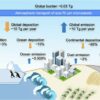Do climate change deniers bend the facts to avoid having to modify their environmentally harmful behavior? Researchers from the University of Bonn and the Institute of Labor Economics (IZA) ran an online experiment involving 4,000 US adults, and found no evidence to support this idea. The authors of the study were themselves surprised by the results. Whether they are good or bad news for the fight against global heating remains to be seen. The study is published in the journal Nature Climate Change.
A surprisingly large number of people still downplay the impact of climate change or deny that it is primarily a product of human activity. But why? One hypothesis is that these misconceptions are rooted in a specific form of self-deception, namely that people simply find it easier to live with their own climate failings if they do not believe that things will actually get all that bad.
“We call this thought process ‘motivated reasoning,'” says Professor Florian Zimmermann, an economist at the University of Bonn and Research Director at IZA.
Motivated reasoning helps us to justify our behavior. For instance, someone who flies off on holiday several times a year can give themselves the excuse that the plane would still be taking off without them, or that just one flight will not make any difference, or—more to the point—that nobody has proven the existence of human-made climate change anyway. All these patterns of argument are examples of motivated reasoning. Bending the facts until it allows us to maintain a positive image of ourselves while maintaining our harmful behavior.
Self-deception to preserve a positive self-image
But what role does this form of self-deception play in how people think about climate change? Previously, there had been little scientific evidence produced to answer the question. The latest study has now closed this knowledge gap—and has thrown up some unexpected results. Zimmermann and his colleague Lasse Stötzer ran a series of online experiments, using a representative sample of 4,000 US adults.
At the center of the experiments was a donation worth $20. Participants were allocated at random to one of two groups. The members of the first group were able to split the $20 between two organizations, both of which were committed to combating climate change. By contrast, those in the second group could decide to keep the $20 for themselves instead of giving it away and would then actually receive the money at the end.
“Anyone keeping hold of the donation needs to justify it to themselves,” says Zimmermann, who is also a member of the ECONtribute Cluster of Excellence, the Collaborative Research Center Transregio 224 and the Transdisciplinary Research Area Individuals & Societies at the University of Bonn. “One way to do that is to deny the existence of climate change.”
As it happened, nearly half of those in the second group decided to hold on to the money. The researchers now wanted to know whether these individuals would justify their decision retrospectively by repudiating climate change. The two groups had been put together at random. Without “motivated reasoning,” therefore, they should essentially share a similar attitude to human-made global heating. If those who kept the money for themselves justified their actions through self-deception, however, then their group should exhibit greater doubt over climate change.
“Yet we didn’t see any sign of that effect,” Zimmermann reveals.
Climate change denial: A hallmark of one’s identity?
This finding was also borne out in two further experiments.
“In other words, our study didn’t give us any indications that the widespread misconceptions regarding climate change are due to this kind of self-deception,” says Zimmermann, summing up his work. On the face of it, this is good news for policymakers, because the results could mean that it is indeed possible to correct climate change misconceptions, simply by providing comprehensive information. If people are bending reality, by contrast, then this approach is very much a non-starter.
Zimmermann advises caution, however, stating, “Our data does reveal some indications of a variant of motivated reasoning, specifically that denying the existence of human-made global heating forms part of the political identity of certain groups of people.”
Put another way, some people may to an extent define themselves by the very fact that they do not believe in climate change. As far as they are concerned, this way of thinking is an important trait that sets them apart from other political groups, and thus they are likely to simply not care what researchers have to say on the topic.
More information:
A Representative Survey Experiment of Motivated Climate Change Denial, Nature Climate Change (2024). DOI: 10.1038/s41558-023-01910-2
Provided by
University of Bonn
Citation:
Why are people climate change deniers? Study reveals unexpected results (2024, February 2)



